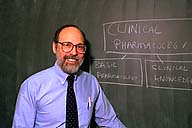
For Release: October 15, 2008
Contact: DMS Communications (603) 650-1492
Dartmouth Medical School Educator David Nierenberg Wins National Teaching Award

Dr. David W. Nierenberg
Hanover, N.H.—Dartmouth Medical School's education dean has been honored with one of the country's highest medical student teaching accolades, the Alpha Omega Alpha Robert J. Glaser Distinguished Teacher Award, to be presented at the Association of American Medical Colleges (AAMC) annual meeting Nov. 1 in San Antonio, Texas.
Dr. David W. Nierenberg, the Edward Tulloh Krumm Professor of Medicine and of Pharmacology and Toxicology at DMS, and senior associate dean for medical education, received the 2008 award, established by the Alpha Omega Alpha (AOA) medical honor society in 1988 to provide national recognition to faculty members who have distinguished themselves in medical student education and named for long-time AOA executive secretary Dr. Robert J. Glaser.
An "educational star," as students refer to him, Nierenberg has shone brightly in the Dartmouth Medical School (DMS) firmament for almost three decades. He is also chief of the division of clinical pharmacology at Dartmouth-Hitchcock Medical Center, and has served as an attending and consulting physician at the VA Medical in White River Junction, Vermont.
"A leader in innovative teaching, Dr. Nierenberg is popular among his students for the clarity and passion of his lectures, his engaging style and has a legacy of grateful alumni. Obviously, as evidenced by his selection for this award, his contributions to educational excellence have made their mark at Dartmouth and at the national level," said DMS Dean Dr. William R. Green.
Nierenberg is a stickler for good penmanship—though perhaps not in the traditional sense of the word. As part of his "don't take any gifts from industry" policy, he regularly hosts "dirty pen swaps" to rid students of drug company favors and, according to one source, proudly replaces them with skinny, 39-cent ones.
"I am passionate about making sure that when our fourth-year medical students become interns, they will prescribe the most appropriate drug for each individual patient, not simply the drug that they remember best because of a recent gift from a pharmaceutical representative," Nierenberg said.
I am passionate about making sure that when our fourth-year medical students become interns, they will prescribe the most appropriate drug for each individual patient, not simply the drug that they remember best because of a recent gift from a pharmaceutical representative.
—Dr. David Nierenberg
He has received multiple teaching awards from students and residents for his ability to make even the most complex pharmacological issues accessible to all learners and the school receives many letters from grateful alumni about him.
Recruited by DMS to establish a division of clinical pharmacology in 1981, Nierenberg has become a driving force behind numerous changes and innovations in the school's curriculum. He introduced problem-based learning to the medical school, and helped design the Dartmouth Medical Encounter Documentation System (DMEDS), a software program that helps students monitor their progress in acquiring the six core competencies in each clinical clerkships. Using this software (believed to be the first of its kind in this country to be broadly practical in all core clerkships), students can document their learning experiences with patients and faculty during all clinical rotations, and build their personal academic portfolios.
His development of the required DMS fourth-year course, "clinical pharmacology and therapeutics," is widely recognized for its excellence and is a model for similar courses offered at other medical schools nationwide. Additionally, he helped revise the second-year curriculum by improving and redesigning the "scientific basis of medicine," a sequence of pathophysiology courses referred to as the school's basic science "gem."
Nationally, Nierenberg has been actively involved in the AAMC, serving five years on its Executive Council, and in various capacities in the Council of Academic Societies (CAS), including six years on its administrative board. Most recently, he led a study and report for the AAMC Medical School Objectives Project, "Contemporary Issues in Medicine: Education in Safe and Effective Prescribing Practices." He has also served in several leadership positions in the American Society for Clinical Pharmacology and Therapeutics, including president in 1993.
After receiving his BA from Harvard College, Nierenberg studied in England at Oxford University. He returned to earn his MD at Harvard Medical School, followed by his residency in internal medicine at what is now Beth Israel Deaconess Medical Center, Boston. He completed his training with a fellowship in clinical pharmacology at the University of California, San Francisco, then served as chief medical resident at Stanford Medical Center.
Nierenberg has served as a peer-reviewer for numerous journals, including the New England Journal of Medicine and the Journal of the American Medical Association, and as an associate editor for Clinical Pharmacology and Therapeutics. He also coauthored or co-edited three clinical pharmacology textbooks and has published 75 original research papers, all of which—one may presume, according to the award citation—were written with "clean" pens.
-DMS-